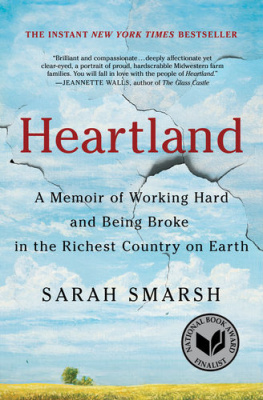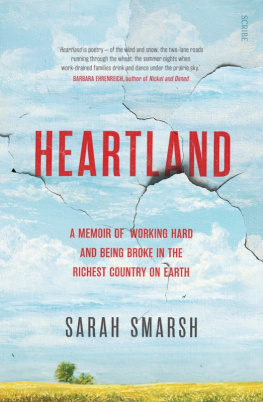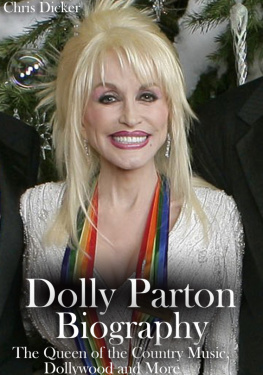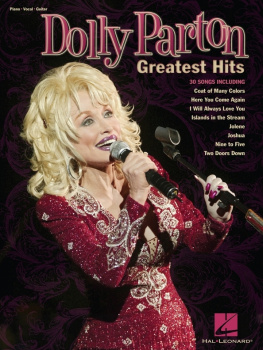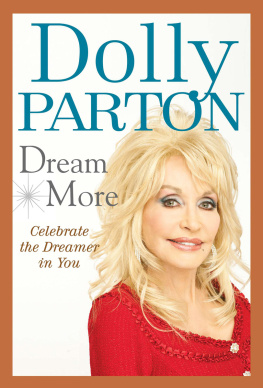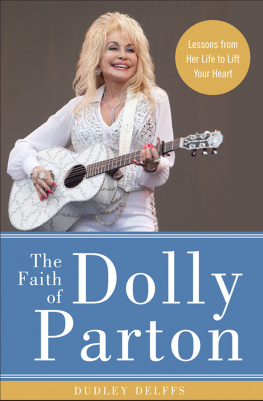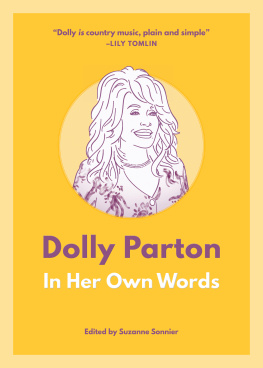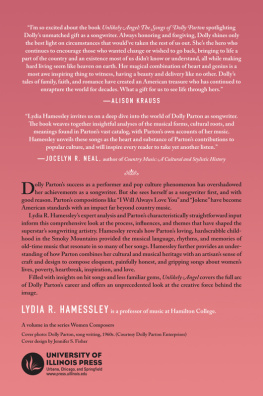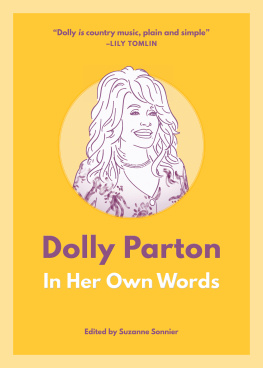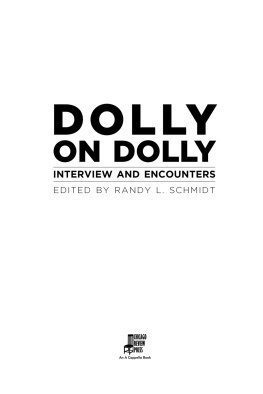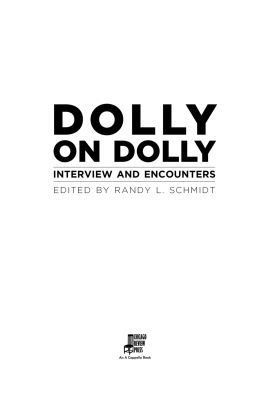Sarah Smarsh - Dolly Parton and the Women Who Lived Her Songs
Here you can read online Sarah Smarsh - Dolly Parton and the Women Who Lived Her Songs full text of the book (entire story) in english for free. Download pdf and epub, get meaning, cover and reviews about this ebook. year: 2020, publisher: Scribner, genre: Non-fiction. Description of the work, (preface) as well as reviews are available. Best literature library LitArk.com created for fans of good reading and offers a wide selection of genres:
Romance novel
Science fiction
Adventure
Detective
Science
History
Home and family
Prose
Art
Politics
Computer
Non-fiction
Religion
Business
Children
Humor
Choose a favorite category and find really read worthwhile books. Enjoy immersion in the world of imagination, feel the emotions of the characters or learn something new for yourself, make an fascinating discovery.
- Book:Dolly Parton and the Women Who Lived Her Songs
- Author:
- Publisher:Scribner
- Genre:
- Year:2020
- Rating:4 / 5
- Favourites:Add to favourites
- Your mark:
- 80
- 1
- 2
- 3
- 4
- 5
Dolly Parton and the Women Who Lived Her Songs: summary, description and annotation
We offer to read an annotation, description, summary or preface (depends on what the author of the book "Dolly Parton and the Women Who Lived Her Songs" wrote himself). If you haven't found the necessary information about the book — write in the comments, we will try to find it.
Sarah Smarsh: author's other books
Who wrote Dolly Parton and the Women Who Lived Her Songs? Find out the surname, the name of the author of the book and a list of all author's works by series.
Dolly Parton and the Women Who Lived Her Songs — read online for free the complete book (whole text) full work
Below is the text of the book, divided by pages. System saving the place of the last page read, allows you to conveniently read the book "Dolly Parton and the Women Who Lived Her Songs" online for free, without having to search again every time where you left off. Put a bookmark, and you can go to the page where you finished reading at any time.
Font size:
Interval:
Bookmark:
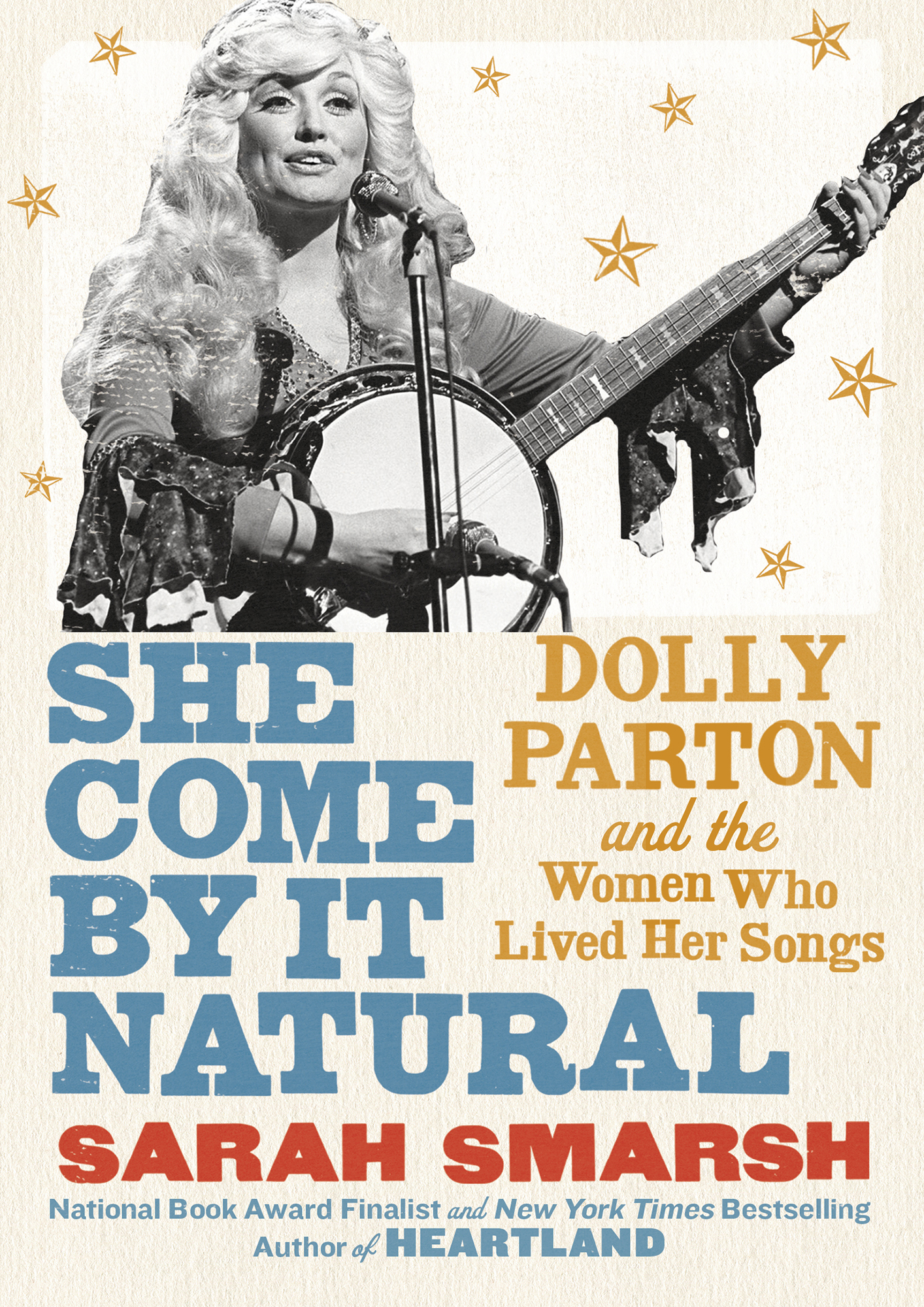

For Grandma Betty
I f you doubt that women have advanced much during the century since they gained the right to vote in 1920, consider the present-day phenomenon that is Dolly Parton.
She adorns female torsos as a T-shirt, declaring power not with the term feminist but with a big ol pile of hair. She burns on desks as a blasphemous prayer candle, her image canonized with a halo (above a big ol pile of hair). Well into her seventies, she frequently holds forth on talk shows and awards-ceremony stages where women of a certain age historically have gone unseen.
People cant get enough of Dolly, who is nowas hagiographic magazine pieces, breathless tweets, and diverse, roaring audiences attesta universally beloved icon recognized as a creative genius with a goddess-sized heart.
Not so long ago, she was best known by many people as the punch line of a boob joke.
Why, then, this new shift in regard?
When Parton was born into rural poverty in 1946, womens suffrage had been granted by US constitutional amendment just twenty-six years prior. Women had recently made economic strides amid a wartime economy but still were widely abused by a system in which the female body had few protections from assault, unwanted pregnancy, or undervalued labor. Women in poverty and women of color fared the worst, on the losing end of societal structures favoring wealth and whiteness. Meanwhile, their contributions toward gender equality went unnoticed, undocumented, and ill-understood.
By the 1960s, young Partonshort on book-learnin but long on smartsleft her Appalachian holler with independent dreams that defied gender norms. Like so many women of her generation, she got the job done, breaking free from the shackles of mens income, mens decisions, mens anything. And also like so many, she was woefully underestimated and undervalued along the way.
While she was offered as a smiling girl singer at the outset of her career and referenced foremost by her physical attributes for decades to come, Parton was a brilliant forcenot just in songwriting and singing but in gender performance and business. Many of her twenty-first-century fans are thus discovering what was there all along, in plain sight but for the blinders of patriarchy: Partons artistry, intellectual depth, and self-fashioned paradoxes that slyly comment on our countrys long-denied caste system (looking cheap, say, while by all accounts acting with pure class).
There is about the current Dolly fervor, I sense, an apology among some for the lifelong slut-shaming: I had no idea she was all those things. Now I understand. Now I see better. Parton projected a sweetly defiant self-possession throughout her career in a mans world; one doesnt get the impression that she expected or cared whether such validation would come. But its a magnificent thing to witnessan atonement countless women have deserved but never received, flowering while the woman is alive to see it.
Like Dolly, I grew up on a struggling family farm (albeit with indoor plumbing). My hard luck, like Dollys, was mixed with the unjust advantage of white skin and the chance fortune of a strong mind. But the palms of my hands were red and swollen, cut by stems of invasive ryegrass that I pulled from our wheat fields before summer harvest, and the difficult but beautiful world I knew was dying in the cogs of industrial economies.
I was a reader, when I could get ahold of something to read, and literature showed me places Id never seen. Another art form, though, showed me my own place: country music. Its sincere lyrics and familiar accent confirmed, with triumph and sorrow, that my homeinvisible or ridiculed elsewhere in news and popular culturedeserved to be known, and that it was complicated and good.
I grew up to sometimes inhabit more cosmopolitan places and found around me a common refrain about music: I like everything except country. (Or, sometimes, I like everything except country and rap.) If someone did like a country song or musician, this information required a qualifier: I dont like country music, but I do like Johnny Cash. The snickering summary of the genre, among those who didnt know it firsthand: My pickup truck broke down and my dawg and my woman left me. (A classist dismissal not unlike, perhaps, racist dismissals of rap music.) It all sounds the same, people told me, proving nothing but their ignorance.
So, in 2016, when I heard about a new fellowship to commission extensive writing on the intersection of roots music and culture for the small but excellent No Depression magazine, I jumped at the chance. Id already been doing research for a piece of writing about Partons reemergence that election year, during which she was touring with a new record, as a unifying balm for a country freshly torn by social upheaval. Political headlines were fixating on a hateful, sexist version of rural, working-class America that I did not recognize. Dollys music and life contained what I wanted to say about class, gender, and my female forebears: That country music by women was the formative feminist text of my life.
Parton does not identity as a feminist and, like me, comes from a place where theory is a solid guess about how the coyotes keep getting into the chicken house. Her decades-long tendency to perform while wearing all white is not, I am certain, a nod to suffragists. But her work is a nod to women who cant afford to travel to the march, women working with their bodies while others are tweeting with their fingers.
The journalism fellowship offered twenty-five cents per word for what would be a yearlong efforta poverty wage and far less than Id earned a decade prior for writing easy airline-magazine features. (Such is the post-digital economic state of journalism.) I was already under deadline with a major publishing house for a book that I knew might be my lifes work, Heartland. There was nothing sensible, for little pay and a niche magazines small readership, about spending a year concurrently writing about Dolly Parton. I submitted my application.
One month before the 2016 presidential election, I learned that Id won the fellowship, funded by the FreshGrass Foundation. My work would be published by No Depression as a four-part, print-only series over the course of 2017. The moment in which the writing emergedoutlined just before the first Womens March, completed just before the mainstream explosion of the #MeToo movementis palpable in these pages.
Now, amid another election year and a political climate still roiling, points on gender and economic status remain timely. But this story is about much more than that. Its about leaving home but never really leaving home. Its about an unfashionable quality in our angry societygraceand its ability to inspire the best in others. Its also about a seventy-year-old woman telling a hot young cowboy to dance in place while she plays the fiddle.
The contents are slightly revised from their original serial form, in part to create the seamless read a book requires. Time references have not been edited (i.e., changing last summer to four years ago), preserving a snapshot of a critical moment in America. Its a snapshot that I know to have been heavily consulted and directly drawn from by national media, including a hit podcast on which I appeared as a guest.
Since completing this deeply researched work in its original form, I have come across previously published texts that make similar conclusions about country music and Dolly Partonunknown to me while I was writing but in harmony all the same: Nadine Hubbss 2014 book
Font size:
Interval:
Bookmark:
Similar books «Dolly Parton and the Women Who Lived Her Songs»
Look at similar books to Dolly Parton and the Women Who Lived Her Songs. We have selected literature similar in name and meaning in the hope of providing readers with more options to find new, interesting, not yet read works.
Discussion, reviews of the book Dolly Parton and the Women Who Lived Her Songs and just readers' own opinions. Leave your comments, write what you think about the work, its meaning or the main characters. Specify what exactly you liked and what you didn't like, and why you think so.

